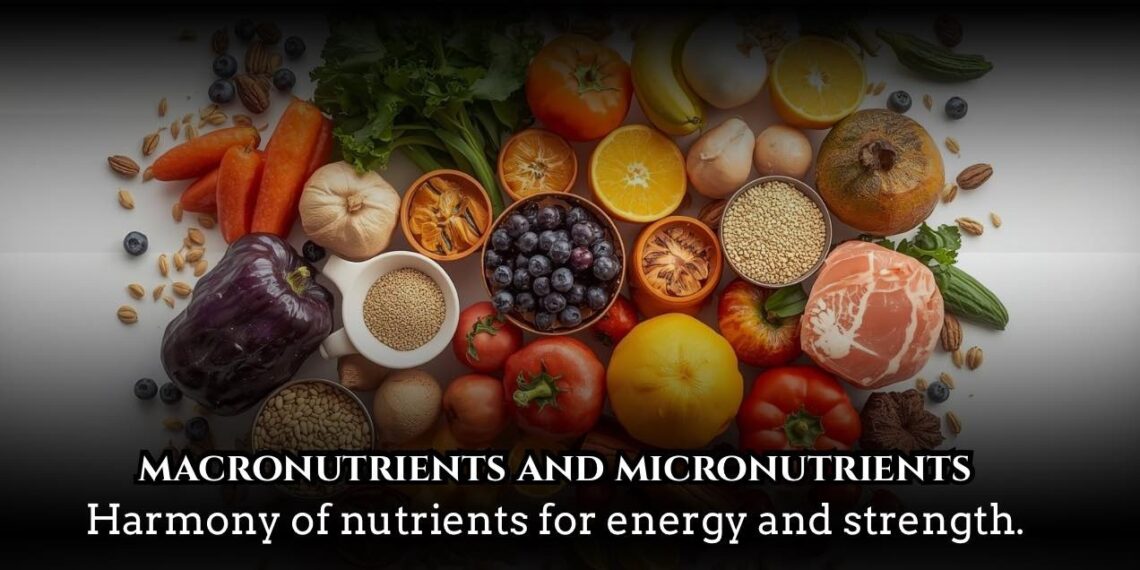Macronutrients and micronutrients work together like a finely tuned engine, ensuring every cell, tissue, and organ performs at its best. Macronutrients such as proteins, fats, and carbohydrates provide the energy needed for daily activity, while micronutrients vitamins and minerals support crucial metabolic and physiological processes.
In this article, we’ll explore how maintaining the right balance between these essential nutrients enhances digestion, boosts immunity, and supports overall vitality. You’ll also discover how nutrient absorption, dietary balance, and healthy meal planning contribute to long-term well-being. Whether your goal is better energy, improved metabolism, or stronger immunity, understanding this balance is the foundation of optimal body function.
Understanding the Role of Macronutrients and Micronutrients
A healthy body relies on the precise coordination of nutrients that fuel energy, growth, and repair. Macronutrients and micronutrients are the foundation of this process, each performing distinct yet complementary functions. While macronutrients provide energy and structure, micronutrients regulate the complex biochemical reactions that sustain life. Without their proper balance, even the most nutrient-rich diet can fall short of supporting optimal health.
What Are Macronutrients?
Macronutrients are nutrients required in large amounts to provide energy and maintain body structure. They include carbohydrates, proteins, and fats. Each serves a specific purpose and contributes differently to your overall wellness.
Carbohydrates: The Body’s Primary Energy Source
Carbohydrates are broken down into glucose, which fuels brain function, physical activity, and cell metabolism.
Functions include:
• Supplying energy for daily activities
• Supporting brain and nervous system function
• Assisting in fat metabolism
Healthy sources: whole grains, fruits, vegetables, and legumes
Proteins: The Building Blocks of Life
Proteins repair tissues, build enzymes and hormones, and support muscle growth.
Functions include:
• Forming muscles, organs, and skin
• Aiding in enzyme and hormone production
• Supporting immune function
Rich sources: eggs, fish, beans, and lean meats
Fats: Essential for Energy Storage and Hormone Health
Despite common misconceptions, healthy fats are vital for nutrient absorption and brain health.
Functions include:
• Regulating hormone production
• Protecting organs and insulating the body
• Aiding absorption of fat-soluble vitamins (A, D, E, K)
Healthy sources: nuts, olive oil, avocados, and fatty fish
What Are Micronutrients?
Micronutrients are vitamins and minerals needed in smaller amounts but are equally critical for body function. They regulate enzyme activity, strengthen immunity, and ensure normal cell development.
Vitamins: The Regulators of Vital Functions
Vitamins play specific roles in maintaining the immune system, metabolism, and cellular repair.
Key vitamins include:
- Vitamin A helps maintain healthy eyesight and promotes good skin health.
- Vitamin C – strengthens the immune system and promotes healing
- Vitamin D aids in calcium absorption and contributes to strong, healthy bones
- Vitamin B-complex – aids energy metabolism and brain function
Minerals: The Body’s Functional Foundation
Minerals are inorganic elements that help maintain fluid balance, bone structure, and nerve transmission.
Essential minerals include:
• Calcium – builds strong bones and teeth
• Iron – supports oxygen transport in blood
• Zinc – aids immune defense and wound healing
• Magnesium – regulates muscle and nerve function

The Importance of Nutrient Balance
Balancing macronutrients and micronutrients is crucial for sustaining metabolic harmony. An imbalance such as excessive carbohydrate intake or insufficient vitamins can disrupt energy levels, immune response, and organ performance.
Benefits of proper nutrient balance include:
• Improved metabolism and digestion
• Enhanced energy levels and endurance
• Stronger immunity and faster recovery
• Better focus and mental clarity
Maintaining this balance through dietary planning helps prevent chronic conditions like diabetes, heart disease, and obesity.
Factors Influencing Nutrient Absorption
Even a well-planned diet may not guarantee optimal nutrient uptake. Several factors affect absorption efficiency:
- Digestive health – gut microbiota and enzyme activity influence how nutrients are processed.
- Food combinations – certain nutrients enhance or inhibit absorption (e.g., vitamin C improves iron uptake).
- Age and lifestyle – metabolism slows with age, affecting nutrient requirements.
- Cooking methods – overcooking can destroy heat-sensitive vitamins like C and B-complex.
Understanding these factors supports better nutrient absorption and utilization within the body.
Challenges in Maintaining Nutrient Balance
Modern diets often prioritize convenience over nutrition, leading to deficiencies and imbalances. Processed foods, high sugar intake, and skipping meals can reduce the intake of essential vitamins and minerals.
Common challenges include:
• Poor dietary variety
• Inadequate hydration
• Excessive consumption of processed foods
• Stress and irregular eating habits
Addressing these issues through mindful dietary balance ensures consistent nutrient supply and better long-term health.
Practical Tips for a Balanced Nutrient Intake
Achieving balance doesn’t have to be complicated. Small, sustainable changes in daily habits can significantly improve your nutritional profile.
Tips for maintaining balance:
- Add a diverse range of colorful fruits and vegetables to your meals.
- Combine complex carbohydrates with lean protein sources
- Choose healthy fats over trans fats
- Stay hydrated to support digestion and absorption
- Plan meals ahead for better nutrient diversity
Example of a balanced meal:
Grilled salmon (protein and healthy fats) with quinoa (complex carbohydrate) and steamed broccoli (vitamins and minerals).
Conclusion
Maintaining the right balance of macronutrients and micronutrients is key to achieving lasting health and vitality. These essential nutrients work together to fuel energy, strengthen immunity, and support every body function. By focusing on balanced eating habits, nutrient-rich foods, and mindful dietary balance, you can enhance your overall well-being and prevent future deficiencies. Remember, good nutrition is a lifelong journey continue to learn more about your body’s needs, make informed food choices, and explore ways to keep your diet balanced for optimal performance and long-term health.





